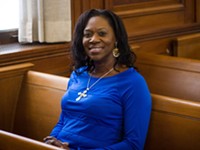[
{
"name": "500x250 Ad",
"insertPoint": "5",
"component": "15667920",
"parentWrapperClass": "",
"requiredCountToDisplay": "1"
}
]
Nearly 30 years after the Supreme Court recognized women's constitutional right to end unwanted pregnancies through abortion in Roe v Wade, that right is facing what may prove to be its most serious challenge.
Anti-choice activists have been rallying against Roe for decades, chipping away at the decision's legal foundation with the help of sympathetic judges at the federal and state levels. Several states have also made it more difficult for women to undergo the procedure by passing laws restricting access to abortion via mandatory waiting periods and parental and spousal notification.
But last November's elections gave Republicans a majority in both houses of Congress --- and control of the White House --- for the first time since the Roe decision. Both President Bush and new Senate Majority Leader Bill Frist are staunchly anti-choice.
That could clear the way for anti-choice legislation that's previously passed in the House to become law. Republican control of the Senate may also lead to the confirmation of several anti-choice judges nominated for federal judgeships by the Bush administration. And there's wide speculation that the Supreme Court itself will experience turnover this summer, with the retirement of one or more aging justices. A sympathetic Senate could make confirmation of an anti-choice justice smooth sailing.
For the defenders of a woman's right to choose, there are stormy waters ahead, indeed.
Legislation banning so-called "partial birth" abortions will likely be the first measure to reach the Senate floor for a vote. Bush has repeatedly pledged to sign such a law --- which former President Clinton vetoed in 1996 and 1997 --- and the idea of banning the rare practice has broad public support.
A recent USA Today/CNN/Gallup poll found that 70 percent of respondents support banning abortions performed in the last six months of pregnancy, except in cases where the procedure would save the life of the mother. (The same poll found that only 38 percent of respondents favor a constitutional amendment outlawing abortion except in order to save the life of the mother.)
The Supreme Court has repeatedly found state laws banning "partial birth" abortions to be unconstitutional, citing a lack of provisions protecting the life or health of the mother. Justices have also expressed concerns such legislation is so vaguely defined that it undermines Roe.
A "partial birth" abortion ban, without an exception for the mother's health, passed in the House again last July. Among legislators representing parts of Monroe County in the House, Democrat Louise Slaughter and Republican Amo Houghton both voted against the ban, while Republicans James Walsh and Tom Reynolds supported it.
Top Republicans have indicated they have since crafted a ban that can pass Constitutional muster, but have not yet unveiled it.
Several other measures restricting access to abortion or potentially undermining Roe's legal foundation have passed the House since the 2000 election, and could reach the Senate floor in 2003.
The "Unborn Victims of Violence Act," passed in April 2001, is ostensibly designed to create a separate, additional criminal penalty if an unborn child is hurt or killed in the commission of a crime. But by elevating the legal status of a fetus to that of an adult, it could render Roe moot by making abortion the legal equivalent of murder. Bush has pledged to sign the bill, which was supported by Walsh and Reynolds and opposed by Slaughter and Houghton.
Last April, the House passed the "Child Custody Protection Act," which would make it a federal crime to transport a minor over state lines in order to have an abortion performed without meeting the parental notification requirements of her home state. New York does not require parental notification.
And, last September, the House passed the so-called "Abortion Non-Discrimination Act." A fact sheet on the legislation compiled by the National Organization for Women calls it "one of the most dangerous and burdensome of all of the many anti-abortion and anti-contraception bills being promoted by extremist opponents of women's reproductive health care."
As the fact sheet outlines, were the bill to become law, health care clinics that receive federal Title X funds --- clinics that primarily serve low-income women --- would no longer be required to provide information about abortion options as a condition of receiving those funds. (Title X money cannot be used to pay for an abortion, but clinics receiving Title X funding can provide referrals to abortion providers.)
Because the legislation does not define "abortion," the fact sheet states, religiously affiliated hospitals and other health care providers could be exempted from state laws that require them to provide emergency contraception to rape victims. (Choice advocates argue that emergency contraception is not abortion, as it merely prevents pregnancy from occurring.)
Furthermore, the fact sheet asserts, the bill would nullify a state's ability to comply with the Hyde Amendment, which entitles Medicaid recipients to abortion coverage in cases of rape, incest, or when the mother's health is at stake. And the bill would prevent states from requiring health-care providers that receive state Medicaid funds to provide abortion referral services, or even information about contraception, if the method is deemed by the provider to be "abortifacient," or the equivalent of an abortion.
Again, Slaughter and Houghton voted against the act, and Reynolds and Walsh voted in favor of it.
New York State was "at the forefront of legalizing abortion," says Shelley Page, spokeswoman for Planned Parenthood of the Rochester/Syracuse region. Page notes that New York legalized the practice three years before Roe went into effect.
Since then, the state legislature "has remained reasonably supportive of reproductive freedom in this state," Page says. Bills that would ban late-term abortions or impose restrictions, like waiting periods, come up from time to time, but don't go very far in the legislative process, thanks in large part to the Democratically held Assembly and its pro-choice speaker, Sheldon Silver.
Governor George Pataki is nominally pro-choice. But as the Westchester Coalition for Legal Abortion notes, as a state legislator, Pataki consistently voted against Medicaid funding for abortions; and as governor, he has pledged to sign bills banning "partial-birth" abortions and requiring parental notification --- should they ever reach his desk.
"We feel the threat is at the federal level, and not at the state level right now," Page says, but adds, "that doesn't mean we don't have be vigilant on the state level. We can't be complacent about rights we have."
Page expressed alarm over Bush's recent renomination of two anti-choice judges ---- Federal District Court Judge Charles Pickering and Texas Supreme Court Justice Priscilla Owen --- for the 5th Circuit Court of Appeals. Both judges' initial nominations were defeated in the Senate last year --- before Republicans took control of that house, which confirms nominees --- in part over concerns about their records on human and reproductive rights.
And these days, Page and other choice advocates are as concerned for women's health as they are for the health of the current Supreme Court justices.
Chief Justice William Rehnquist, 78, is widely rumored to be ready to step down, and either Justice Sandra Day O'Connor, 72, or John Paul Stevens, 82, may do the same this year. Though the current Supreme Court is hardly a bastion of pro-choice sentiment, a court headed by a Bush appointee would almost certainly be less so.
Speaking of Roe V. Wade, abortion
-

Abortion conflict flares up in Batavia
Feb 18, 2019 -

Advocates, lawmakers push for abortion law vote
Aug 6, 2018 -

The stained-glass ceiling
Feb 8, 2017 - More »
Latest in Featured story
More by Chris Busby
-

Chasing Amo
Jul 30, 2003 -

Pucker up, piggie
Jul 9, 2003 -

Alan's angels
Jul 9, 2003 - More »






